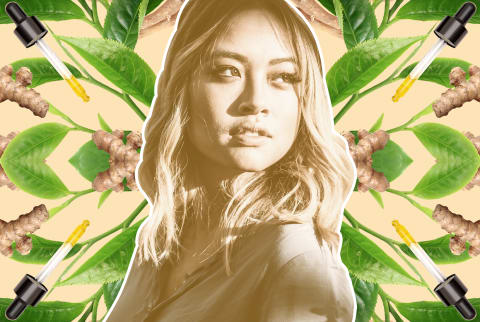Advertisement
Feeling Anxious? These 12 Vitamins, Minerals & Herbs May Help


When anxiety reaches a fever pitch, many people want to reach for something that will help soothe their nerves and bring them back to calm—STAT. That's understandable; anxiety and stress can be unbearable and hugely interfere with your life—including your health, your job, and your relationships. We have a lot of pharmaceutical options to choose from, many of which provide extremely quick and effective relief. It's important to remember, however, that these pharmaceutical options are not without side effects, which range from weight gain to muscle weakness to decreased libido.
The good news is that there are actually plenty of safe and effective supplements for anxiety. Supplements are less regulated than prescription medication, but once you identify which substances are genuinely effective and which companies have impeccable integrity in their manufacturing process, you can put together a treatment plan of supplements to support you when you're feeling anxious.
Sometimes prescription medications are still necessary and supplements will never take the place of real food, adequate sleep, exercise, sunshine, stress management, or having meaningful work and a strong community, but while these aspects of life are a work-in-progress, here are some of my go-to supplements for managing anxiety and stress:
1. Magnesium glycinate or magnesium threonate
When it comes to treating anxiety, run don't walk to magnesium. Most of us are deficient in this mineral1 (our soil is depleted, and thus our food is deficient in magnesium). Magnesium deficiency can contribute to anxiety, migraines, menstrual cramps, insomnia, muscle tension, constipation, and even high blood pressure and heart disease. Start to restore your body's magnesium levels by taking this supplement at bedtime, I often recommend the forms magnesium glycinate or magnesium-l-threonate. It's generally very safe and well-tolerated. If you develop loose stool, decrease your dose.
2. Hemp oil
If you're an mbg regular, you've heard of hemp oil—and one of its main components CBD—at least once or twice. This hot, new (but actually very old) player on the scene has been a game-changer in my practice. I usually steer people toward liquid hemp oil that you take with a dropper sublingually. Most of my patients start with a dose of 15 mg and increase until they start experiencing a benefit. Some of my patients are taking 45 to 60 mg a day for anxiety, but at higher doses, it can make you sleepy. For some people, it can take a few weeks of regular use to start experiencing the full benefit, so stick with it for at least that long before you make any final judgments. In the future, we'll be learning more and more about the endocannabinoid system—the larger system in the body that hemp-based remedies interact with—and how keeping it healthy might be able to quell anxiety as well or prevent it in the first place.
3. L-theanine
L-theanine is a wonderful, safe, and very effective supplement for anxiety. It creates a sense of calm while also improving focus, attention, memory, and learning. It has a similar effect on the brain as meditation (though it's not a substitute for a regular meditation practice!). I recommend 200 to 400 mg two to three times a day.
4. Ashwagandha
Ashwa-whaat? Don't worry about pronouncing it. Ashwagandha is an adaptogenic herb that has been prescribed for ages by ayurvedic practitioners. "Adaptogenic" basically means it helps your body adapt to stress, or, even more specifically, it helps your body shift in whichever direction it needs to go to achieve balance. If you suspect stress plays a significant role in your anxiety (show of hands...OK, all of us), then this is a wonderful tool for you. Try taking 225 to 500 mg twice a day, and expect to take it for several weeks before achieving the full benefit. I like my patients to take it continuously for three to six months and then take a break.
5. Inositol
Inositol is one of the few supplements that can even be helpful as a prescription anxiety treatment. That is, it can be taken as needed to treat anxiety that arises in the moment. The major issue I encounter with inositol in my practice is that it can cause gas and loose stool. The key to success is to start VERY slowly and titrate up gradually. Start by mixing 3 grams of inositol powder in a water bottle, and sip it slowly over the span of a day. Gradually increase the dose to 10 grams per day over the course of a few weeks. Keep your inositol water bottle on hand, and take a sip when you need some relief.
6. Curcumin
Not an anti-anxiety supplement per se, I still end up putting many of my patients with anxiety on curcumin because it's a powerful anti-inflammatory supplement, and inflammation is frequently at the root of anxiety. Curcumin is the active component of turmeric, the Indian spice that gives curry its characteristic golden-yellow color. This supplement is safe (it's basically just food encapsulated), well-tolerated, and extremely effective. If you have any reason to believe you may be inflamed (eczema, asthma, digestive issues, acne, joint pain, or just living in the world), give curcumin a try. You can cook with it—just make sure to combine it with pepper (turmeric works synergistically with pepper)—or take it as a supplement.
7. Probiotics
A compromised gut flora is at the root of so much anxiety. A good probiotic (along with regular consumption of fermented foods and starchy vegetables) is an essential part of an anti-anxiety regimen. I harbor a pet theory that there are certain gut bacteria that are responsible for synthesizing the neurotransmitter GABA. GABA is the primary neurotransmitter that allows us to feel calm, relaxed, sleepy, and OK. This could be part of why we're in an epidemic of anxiety—since we all have less-than-optimal microbiomes, we're frequently missing the bacteria that manufactures this most calming neurotransmitter. Begin to replenish your gut flora, and this will help decrease your overall anxiety levels.
8. Vitamin B12
This essential vitamin is low or outright deficient in so many of my patients struggling with anxiety. Sometimes it's a function of dietary choices (B12 is only found in animal foods, so vegetarians and vegans tend to have lower B12 levels), and sometimes there's an autoimmune condition called pernicious anemia that impedes absorption of vitamin B12, which itself is frequently caused by gluten intolerance. If you don't know your B12 status, ask your doctor to test it. If you're even a bit low, consider supplementing by way of a B12 shot or a good-quality methylcobalamin.
9. Lemon balm
If someone is looking for an additional tool in their arsenal and they want something gentle and soothing, I usually recommend a lemon balm tincture. This is an evidence-based treatment for anxiety, and it can be a lovely ingredient to reach for when you're feeling consumed by anxiety. I usually recommend getting a tincture and taking a dropperful a few times a day, as needed for anxiety.
10. PharmaGABA
This is not my first-line treatment, but when patients are struggling with psychiatric medication withdrawal, I'll sometimes reach for pharmaGABA to help support their nervous system. GABA is the key to relaxation, but it's not as easy as taking a pill to simply deliver more GABA to your brain. Of the various formulations of GABA, I've found that pharmaGABA does a reasonable job of supporting this need for most patients.
11. Flower essences
Flower essences are an incredibly powerful and often underexplored option for supporting anxiety. Lotus Wei is a brand that manufactures flower essences with meticulous integrity. See which essences you're drawn to, and begin to give yourself this very gentle form of support.
12. Kavinace
Kavinace is a last resort in my practice (and something you should talk to your doctor about before trying). I think of it as intermediate between benzodiazepines and the other supplements on this list. It's effective, but it's not without downsides. I've had some patients develop physical dependence on it, so I don't recommend it cavalierly. In certain cases, it's helpful to have an option that's a few steps milder than the benzodiazepines.
This list gives you a good overview of some of the evidence-based, safe, effective options in the supplement aisle that can offer support when anxiety is overwhelming. Remember that anxiety is often your body communicating something is off or out of balance in your physiology or lifestyle. Supplements never take the place of food, sleep, exercise, nature, community, processing grief and trauma, and meditation when it comes to addressing the root of anxiety. But sometimes, in our darkest hours, it's helpful to have something to reach for. Reach for these helpful supplements, and continue to listen to the communication coming through from your anxiety.

Ellen Vora, M.D. is a board-certified psychiatrist, acupuncturist, and yoga teacher, and she is the author of the No. 1 bestselling book The Anatomy of Anxiety. She takes a functional medicine approach to mental health—considering the whole person and addressing imbalance at the root. Vora received her B.A. from Yale University and her M.D. from Columbia University.
More from the author:
How To Control Anxiety
Check out Decrease Stress & Anxiety For Improved Overall Wellbeing
More from the author:
How To Control Anxiety
Check out Decrease Stress & Anxiety For Improved Overall Wellbeing

Ellen Vora, M.D. is a board-certified psychiatrist, acupuncturist, and yoga teacher, and she is the author of the No. 1 bestselling book The Anatomy of Anxiety. She takes a functional medicine approach to mental health—considering the whole person and addressing imbalance at the root. Vora received her B.A. from Yale University and her M.D. from Columbia University.
Watch Next
Enjoy some of our favorite clips from classes
Enjoy some of our favorite clips from classes
What Is Meditation?
Mindfulness/Spirituality | Light Watkins
Box Breathing
Mindfulness/Spirituality | Gwen Dittmar
What Breathwork Can Address
Mindfulness/Spirituality | Gwen Dittmar
The 8 Limbs of Yoga - What is Asana?
Yoga | Caley Alyssa
Two Standing Postures to Open Up Tight Hips
Yoga | Caley Alyssa
How Plants Can Optimize Athletic Performance
Nutrition | Rich Roll
What to Eat Before a Workout
Nutrition | Rich Roll
How Ayurveda Helps Us Navigate Modern Life
Nutrition | Sahara Rose
Messages About Love & Relationships
Love & Relationships | Esther Perel
Love Languages
Love & Relationships | Esther Perel
What Is Meditation?
Box Breathing
What Breathwork Can Address
The 8 Limbs of Yoga - What is Asana?
Two Standing Postures to Open Up Tight Hips
How Plants Can Optimize Athletic Performance
What to Eat Before a Workout
How Ayurveda Helps Us Navigate Modern Life
Messages About Love & Relationships
Love Languages
Advertisement

What Men Are Getting Wrong About Mental Health, From A Psychologist
Stephen B. Poulter, PhD

Your Grandma's Go-To Supplement Is Once Again Popular (For A Good Reason)
Molly Knudsen, M.S., RDN

What Men Are Getting Wrong About Mental Health, From A Psychologist
Stephen B. Poulter, PhD

Your Grandma's Go-To Supplement Is Once Again Popular (For A Good Reason)
Molly Knudsen, M.S., RDN













